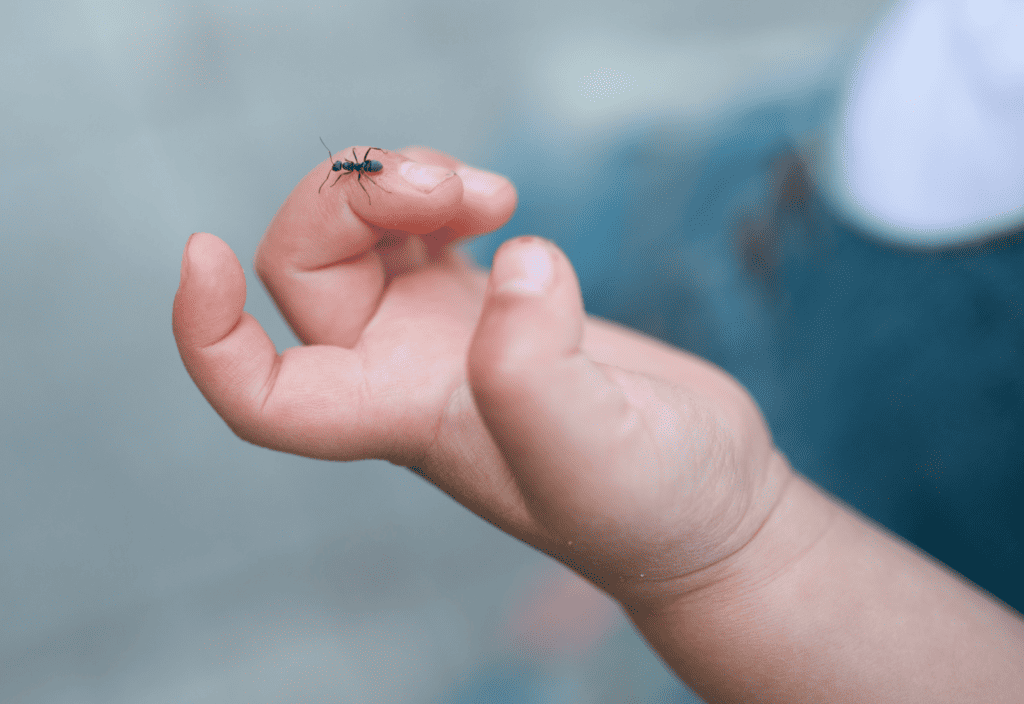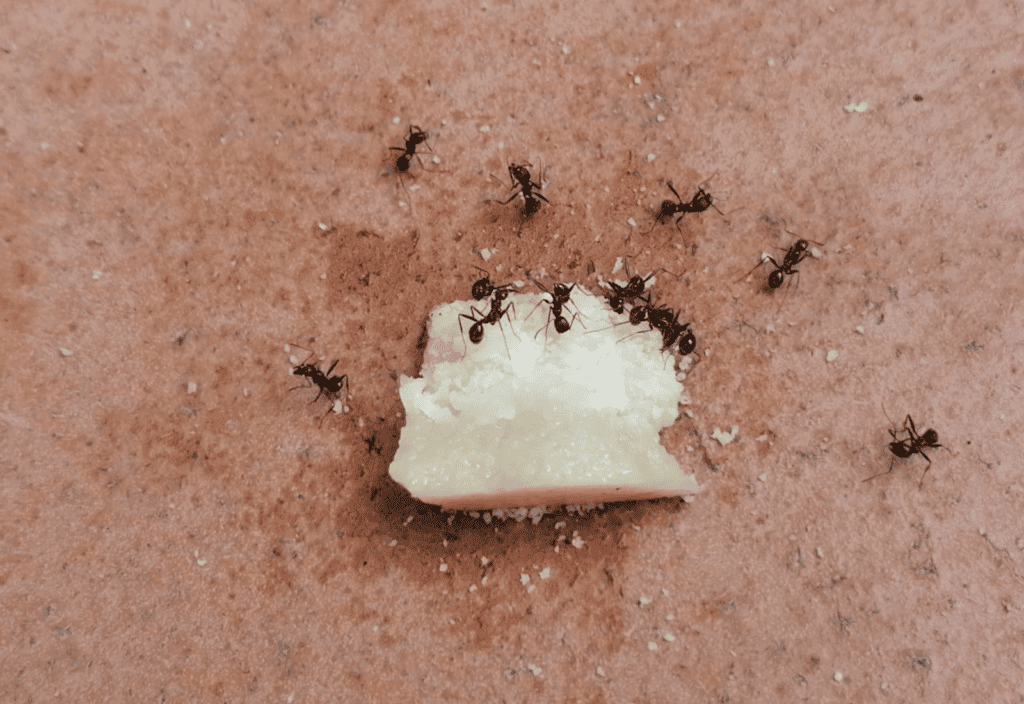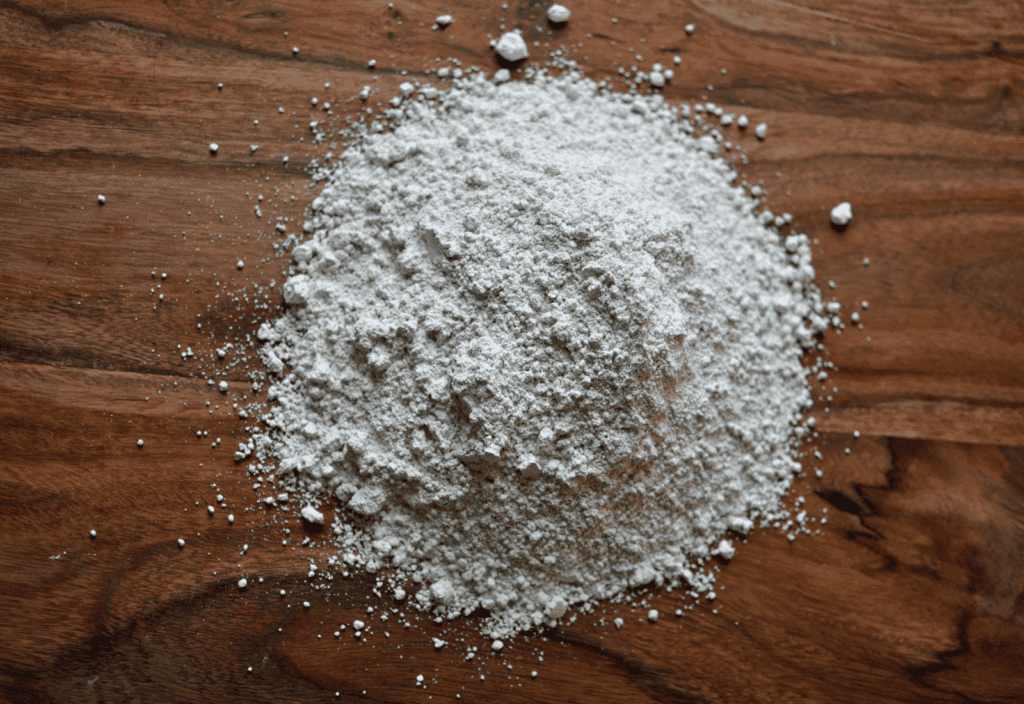If you’ve battled with ants before, you know they can be relentless when you have something they want like food or water! Thankfully, many things can act as a natural ant deterrent to keep those little critters out of your home.

I’ll never forget my first ant battle as an adult. I was a young, clueless 20-something, and I came home to an ant takeover in my kitchen. My course of action was likely similar to that of other uninformed 20-somethings. I ran out to buy Raid.
I sprayed that stuff all over my kitchen cabinets where I kept my food and maybe even in the fridge—I can’t recall now. Gloves and a mask were not in my toolkit, and I am pretty sure I didn’t rinse the surfaces before putting my food back. Eek! I still cringe at the experience.
Can Pest Sprays Be Used Safely?
I was a trusting consumer as many of us are. Improper use is one of the scariest pieces of the puzzle when it comes to the toxins sold on our store shelves. If you don’t know there are simple, effective natural ant deterrents, you may not know how to use Raid “safely.”
I suspect many people use home insect sprays for ants and other insects in the same free-spirited way I did, which can be dangerous. The label suggests removing any pets from the area during and after treatment and covering nearby areas in plastic.
The label also suggests you leave the area and don’t come back until the pesticide is dry. It says not to allow drift in the air or run off. Some Raid product labels suggest using gloves and masks as well. Personally, that sounds like a lot of work to me in order to “safely” use Raid. I doubt you will find many taking these intensive steps.
One particular concern surrounding home insect sprays is that they usually come in aerosol containers, so they linger in the air and are easily breathed in. It’s not as simple as spraying it and waiting for the spray to dry. The sprays contaminate your air then sit in your dust once it finally settles.
The good news, if you do a few basic things, you can most likely avoid ever needing any of those products again. Obviously, there can be exceptions. I know a couple who had a takeover by brown recluse spiders, and, after trying many measures, ended up treating their home.
Thankfully, ants aren’t brown recluse spiders and are more of a nuisance than danger. I’ve successfully gotten rid of ants several times with nothing more than what this will share.
Dangers of Common Household Pesticides
Many people now know the risks associated with traditional pesticides, especially pesticides applied inside the home. Because of this, the demand for safer pest control is higher than ever. This is good news for families, those who work in the industry and for the environment.
I always like to share this study showing that children exposed to indoor pesticides are more likely to develop certain blood cancers, because it’s one that stopped me in my tracks. Pesticides are also confirmed allergy and asthma triggers and linked to various birth defects.
It’s safe to say it’s a good idea to avoid using pesticides, especially indoors, if, at all, possible.
Why Do Ants Come Inside Your House?
Ants usually want food or water, which is why they often find their way to your kitchen. I’ve had several battles with ants, and all but one was in the kitchen.

First things first. Be sure to wipe up crumbs on the counters, especially anything sweet, which is their favorite. You also want to take care of any leaky faucets and seal any obvious entry points, but let’s face it, ants can wiggle thorough some pretty tight spots.
You’ll want to keep an eye on the HVAC unit and spigots on the exterior of the house as well. Ants may find these spots and use them as entry points into the house.
Ants are most active during spring and summer months or when the temperatures are warm. They hibernate during winter, so if you live in a climate like mine (cool half the year) you should get a lengthy break from having to worry about them.
Natural Ant Deterrent Options
I live in a rural area with lots of critters. We do not use any type of traditional pest service, and I have managed to successfully keep bugs out of our home, so I know you can too!
There are quite a few safe ways to get rid of ants including natural ant deterrents. I’ll start with the least invasive and move to more invasive options.
Vinegar
You can use basic white vinegar to wipe up the ants and the trail that they leave behind for their friends to follow. If they have found something they like and created quite the assembly line, you may have to do this every couple of hours for a while until they give up. Again, ants are relentless by nature.
This simple tactic may do the job for minor to moderate ant activity, but if you are dealing with say hundreds of ants, you will likely need to do more.
Lemon or Lime Peels or Juice
Starting on a positive, lemon and lime are lovely smells for a kitchen or anywhere in the home for that matter. If you don’t have a major problem simply setting out lemon and lime peels may offer serve as a mild natural ant deterrent. You can also juice lemons and limes and spray it on your countertops—yum!

Lemon and lime essential oils are stronger and a bit easier than squeezing fruits, so those may be a desired option as well. Lemon and lime oil can repel ants or kill them if you spray a high concentration directly on them. In a 2014 Finland study, lime was found to be the most lethal while lemon was the strongest repellent.
Essential Oils
If wiping up the trail with vinegar isn’t cutting it, you can add a few drops of peppermint essential oil. There are several studies that show the effectiveness of peppermint essential oil at repelling ants.
You can add a few drops of peppermint oil to cotton balls and place them in the areas they frequent. The ants don’t care for peppermint scent at all. You’ll have to keep a strong scent by replacing the cotton balls every few days with fresh ones.
Another essential oil that works as natural ant deterrent is cedarwood. A 2014 study found cedarwood to be very effective at repelling ants and other insects. Cinnamon essential oil may also be worth checking out. The study linked above looks at cinnamon leaves against fire ants, which is simple and safe thing to consider if your struggle is outdoors.
There are a couple of other essential oils with reputations for repelling ants, but these two have seem to have the most evidence of effectiveness.
If you’ve been consistently wiping with vinegar and utilizing the peppermint oil for a full week but still the ants persist, there are some more invasive measures you can try that are still much safer than conventional pesticides.
I’m rather stubborn, so I have persisted with vinegar and peppermint oil for nearly two weeks before conquering the ants. In my case, they weren’t making it to our food pantry, and there weren’t many ants present. Obviously, several factors will determine how long you try each measure.
Diatomaceous Earth
Diatomaceous earth (DE) is perfectly safe for humans assuming you don’t inhale it or get it in your eyes. Just be careful putting it out and be sure to clean it up well afterward. You can put DE out by itself or mix it with sugar to make ant bait.
Ants will eat the DE and take it back to their colony as well. Depending on the type of ant, it may take 2-3 days to completely remedy the problem.

Unlike the vinegar and essential oils, DE will actually kill the ants not just repel them. You can also use DE on ant hills if they are along the perimeter of your home or other undesirable areas like under a swing set. You simply sprinkle it on top of the ant hill.
Baking Soda
Baking soda is a new one to me. I love learning new things when I’m researching for a blog post. It works just like DE, so you may not want to save it for after you’ve tried the repellent strategies listed above or if it is an urgent situation.
Like DE, ants have to ingest the baking soda for it to work, so you may want to mix it with sugar to make ant bait. Baking soda is completely non-toxic and by far the cheapest pesticide you can buy.
Do Ants Have a Purpose?
The older I get the more I hate disturbing nature. It seems every critter has some type of important job and when you get rid of a particular pest another increases. For example, some evidence shows that treating for mosquitos can actually increase mosquito presence over time. This is because the treatments also kill the mosquito predators, so they are able to thrive.
It’s almost like nature knows best ;). That being said, there will be times most of us want or need to destroy ants or other insects, but I believe there is value in keeping it to an absolute minimum. For example, we have lots of ant hills in our yard, and we just avoid them.
It turns out that ants do have at least two important jobs. They improve the nutrient profile of the soil, and they control other insect populations.
Conclusion
I hope this post has convinced you that something as harmless as ants can easily be remedied by using a natural ant deterrent. Hopefully, you’ll try some of these safe ways to get rid of ants.
Check out my related post for a much more in depth look at natural pest management. As always, thanks for stopping by, and I hope you learned something new!